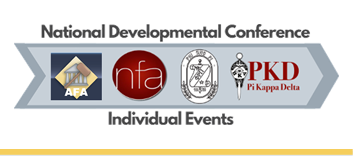Document Type
Standards for Evaluating/Judging
Abstract
The judging of individual events has long been fraught with difficulty, with critics invoking their own idiosyncratic preferences and biases, instead of some form of consistent judging standard. Students have forfeited the advantage of having detailed information about a given judge's philosophy or criticism criteria. In 1984, forensics theorists produced a set of standards by which speeches could be constructed and subsequently evaluated. There exists little or no evidence that coaches/critics have actually adopted these standards, and so, as before, students are left without a guide. This paper examines the history of theory development concerning judging criteria and advances a proposal for a system of uniform judging philosophy statements to be used at national competitions. The proposal incorporates extant theory and relies on models traditionally used in modern academic debate. On the Judging Philosophy Form, each of the judging standards is outlined, with room for response provided. In addition, each standard is to be ranked in order of relative importance in accordance with the critic's own judging behavior. A sample judging philosophy statement form is included. The relative merits of the proposal are discussed in light of potential benefits for the student competitor, the coach/critic and the forensics activity as a whole.
The forensics community has long accepted the importance of establishing consistent judging criteria for contest events. It is axiomatic that such criteria, once constructed, should be made available to student competitors. In debate arenas, for example, there exists a long-held tradition of requiring extensive judging criteria (philosophy) statements of participating coaches! critics in most District and National competitions. Recently, the forensics community has generated judging standards for individual events, but has stopped short of creating a judging criteria (philosophy) statement. Such a statement would bridge theory and reality, providing multiple benefits to the student competitors, their coaches/critics and the activity as a whole. This paper will 1) outline the lack of application of present-day judging standards, 2) advance a simple proposal for a uniform judging criteria (philosophy) statement and 3) 60 discuss the merits of such a proposal. A sample form will be included.
Creative Commons License

This work is licensed under a Creative Commons Attribution 4.0 International License.
Rights Statement
In Copyright https://rightsstatements.org/page/InC/1.0/?language=en
Recommended Citation
Tucker, Rob
(1989)
"A Proposal for the Creation of Uniform Judging Philosopy Statements in Individual Events Competitions: An Attempt to Empower Competitors, Coaches/Critics and the Forensics Activity,"
Proceedings of the National Developmental Conference on Individual Events: Vol. 1:
Iss.
1, Article 30.
Available at:
https://cornerstone.lib.mnsu.edu/ndcieproceedings/vol1/iss1/30

